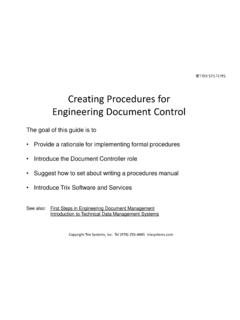Transcription of The Successful Person's Guide to Time Management
1 There Is Enough time !Too little time and too much to do is a common condition for many of us. Everyday demands or chores seem to engulf the day, leaving little time to pursue those things you enjoy. But you do have choices about how you spend your time . Balancing what you need to do with what you want to do can lead to happiness and success. Many of us complain, There just isn t enough time in the day! But the truth is that we have enough time to do what is important in our lives. You can always make time for the people you value and for the activities worth doing. All you need do is become a master of how you use your time - Management skills into habits will take time but what better way to spend it? With the help of this workbook and two or three hours, you can learn valuable techniques for managing your time and your life.
2 By the end of the exercises, you ll know yourself better, have a map of goals for the future, and maybe fulfill a few hat Is Good time Management ?Strictly speaking, we cannot really manage time we can only man-age ourselves. As we acquire new skills in time Management , we gain control over our lives. A key to managing yourself is to know who you are and where you are going. The following exercises will help you evaluate your current time Management practices. You will explore how and why you want to manage your time better and discover what your time - Management priorities are. You will learn to determine the time of day you have the most energy for accomplishing important tasks, as well as what your life goals are and what steps you need to take to accomplish Successful Person s Guide toTime Management Good time Management simply means deciding what you want to get out of life and efficiently pursuing these goals.
3 time Management does not mean being busy all the time it means using your time the way you want to use it which can include large doses of day dreaming and do-ing nothing. Good time Management brings with it increased relaxation, less stress, more sat-isfaction, and greater accomplishment. Dorothy Cudaback, Family Life Extension Specialist2 time Management is a vehicle that can carry you from wherever you are to wherever you want to go. Brian Tracey, author of time PowerEvaluate YourselfA good way to begin taking charge of your life is to give yourself sev-eral good reasons for wanting to manage your time better (for exam-ple, to earn more money, to increase productivity, to free yourself to find the kind of idleness that fosters cultivation of the mind, to spend more time with family and friends).
4 List your reasons below. Focus on what you want and need most in your _____ _____2. _____ _____3. _____ _____4. _____ _____The first step toward turning your desires into reality is to evaluate your current time - Management behaviors to give yourself a baseline for change. Knowing where you stand is a powerful tool; without that you cannot plan where you are going. Assess Your BehaviorUse the time - Management Behaviors matrix (Table 1) on page 3 to assess your current time - Management each statement and assess how well it describes 1. you and your time - Management practices. In the sec-ond column (How often?), indicate how frequently you practice each each statement a second time and assess its 2. value to you.
5 In the third column (How important?), indicate how important each practice is to the second column by the third column and 3. enter the results in the fourth column (Rating).Circle the values in the fourth column that are less 4. than 1. time - Management BehaviorsBehaviorHow often?1 = Seldom 2 = Sometimes 3 = Frequently How important?1 =Not at all2 = Somewhat 3 = VeryRatingI have three or four clearly established personal and career goals that I am striving to use a To Do list make use of a daily planner or calendar to record important events and rank my priorities daily from most to least delegate as many responsibilities as I have adequate time to be with friends and loved am aware of my daily energy complete my most important tasks when I feel most work on my most important tasks before I work on the easy I face an unpleasant task, instead of procrastinating I break the task into manageable.
6 Bite-sized plan ahead by setting aside time on my calendar to complete major schedule time for take good care of myself by rewarding myself for completing realistic the end of most days, I look back on my To Do list and find that I have accomplished the most important take good care of myself by rewarding myself at least twice a necessary, I set limits by saying, No, I just don t have time right now to do that. When waiting for a stop light or for an appointment, I take two or three deep breaths and relax schedule and limit the amount of time each day that I devote to phone calls and strive to handle each item in my mail only am organized well enough that I can find my bills or an important letter in less than five member of my household has clearly defined household ask for help when I want : A score of more than 5 on an item suggests that you value that time - Management practice and do it frequently.
7 The circled items describe practices that you do not find important or have not found time to YourselfAm I practicing the time - Management behaviors that I value most? W hat am I doing right in managing my time ? W hich practices work best for me?_____W hich practices do I consider important and yet seldom act upon? W hat are the possible reasons for my lack of action?_____W hich two or three new behaviors would give me the most control over my life?New behavior Desired result_____ _____ _____ _____5 Know and use your prime time , that time during the day when you are most likely to be alert, enthusiastic, and creative. Dorothy Cudaback, family life Extension specialistFind Your Prime TimeEveryone s energy timetable is different.
8 Some are morning people. Others do better in the evening. One key to better time Management is to find your high-energy periods and schedule complex tasks when you are likely to be at your best. To discover your high-energy prime time , complete the following Choose a typical day to graph your energy level. Be prepared to spend a few minutes each hour evaluat-ing your energy level and recording it on the Above each hour of your day, place a dot in the box that best represents your level of energy for that At the end of the day, draw a line to connect the Examine your peaks and valleys of energy as repre-sented on the graph. Note your high-energy may want to repeat this exercise several days in a row, or on days with varying levels of activity to get an even better picture of your energy levels.
9 In the time - Management Steps You Can Take Today section on page 9 you will find tips for taking advantage of your prime energy GraphENERGY LEVELMORNINGAFTERNOONEVENINGNIGHT5678910 11121234567891011121234 Very HighHighMediumLowSleep6 Failing to plan is planning to fail. A lan Lakein, time Management expertSet Short- and Long-term GoalsGoal setting is crucial to effective time and life Management . You set yourself up for failure with vague, changing, or impossible goals. You must guarantee your own success by learning to construct a goal with meaningful goals become more powerful when you put them into writing. The more specific, realistic, measurable, and achievable your goals are, the greater your chance of reaching them.
10 Write your goals down, and refer to them often. Decisions are easier to make when you know what you only a few goals to begin with. Too often people try to change too much at once and become discouraged because they are too overwhelmed by their plans to put them into action. Following are tips for setting achievable goals. To accomplish each goal, you must perform a series of actions, so make the language of your goal reflect action. Start with to and include an action verb: to climb, to build, to learn, to find, to travel. Give specifics. Add details to your action statement. To com- plete hair and nail design courses ; to climb Mt. Everest ; to study forensics and investigation. Note how you will measure your success.











